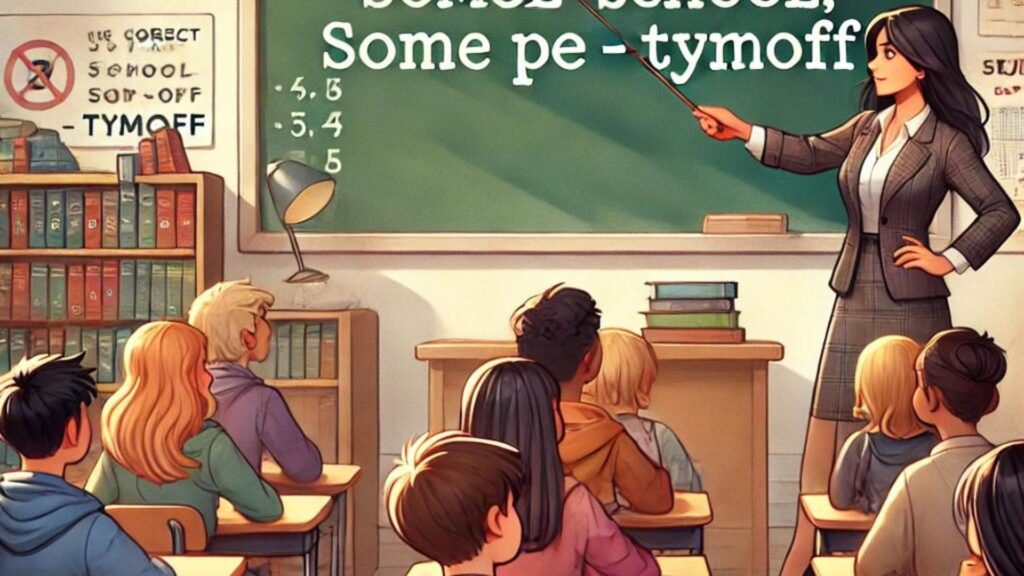Spelling is a fundamental aspect of language and communication. It serves as a critical indicator of literacy and education. In the context of schools, spelling proficiency is not just about avoiding mistakes but also about understanding the nuances and intricacies of the language. The phrase “the correct spelling is school not school. some pe – tymoff” may seem redundant at first glance, but it underscores the importance of attention to detail in spelling. This article delves into the significance of correct spelling, its impact on education, and why such emphasis is placed on getting it right, especially in academic environments.
The Importance of Correct Spelling in Education
Correct spelling is a cornerstone of effective communication. It ensures that the message is conveyed clearly and accurately. In an educational setting, where the primary goal is to impart knowledge and facilitate learning, correct spelling plays a crucial role. It helps in maintaining the integrity of the language and aids in the comprehension of complex concepts. When students spell words correctly, they demonstrate their understanding of the language, which in turn reflects their level of literacy and academic competence.
Inaccurate spelling can lead to misunderstandings and misinterpretations. For instance, misspelling a word can change its meaning entirely, thereby altering the context of the discussion or the lesson being taught. This can have a ripple effect, leading to confusion and miscommunication among students and teachers. Therefore, emphasizing correct spelling in schools is essential to ensure that the intended message is communicated effectively.
The Role of Teachers in Promoting Spelling Accuracy
Teachers play a pivotal role in promoting spelling accuracy among students. They are responsible for creating an environment that fosters learning and encourages students to pay attention to detail. By incorporating spelling exercises and activities into their lesson plans, teachers can help students improve their spelling skills. Additionally, providing constructive feedback on spelling errors can aid students in recognizing their mistakes and learning from them.
Moreover, teachers can use various tools and resources to support spelling instruction. These may include spelling games, flashcards, and digital applications designed to enhance spelling proficiency. By making spelling practice engaging and interactive, teachers can motivate students to take an active interest in improving their spelling skills.
The Impact of Spelling Proficiency on Academic Performance
Spelling proficiency has a direct impact on academic performance. Students who spell words correctly are likely to perform better in writing assignments, exams, and standardized tests. This is because correct spelling contributes to the overall clarity and coherence of written work, making it easier for teachers to assess and understand the content.
Furthermore, good spelling skills are often associated with strong reading abilities. When students can spell words accurately, they are better equipped to recognize and comprehend them in written texts. This, in turn, enhances their reading comprehension and overall literacy skills. Therefore, fostering spelling proficiency can have a positive impact on students’ academic success across various subjects.
Strategies for Improving Spelling Skills
There are several strategies that students can employ to improve their spelling skills. One effective approach is to practice spelling regularly. This can be done through writing exercises, spelling tests, and reading activities. By exposing themselves to a wide range of words and their correct spellings, students can gradually build their spelling proficiency.
Another useful strategy is to use mnemonic devices. These are memory aids that can help students remember the correct spelling of words. For instance, creating a rhyme or a phrase that incorporates the letters of a word can make it easier to recall its spelling. Additionally, breaking down complex words into smaller, more manageable parts can also aid in spelling accuracy.
Students can also benefit from using dictionaries and spell-check tools. These resources provide instant feedback on spelling errors and offer suggestions for correct spellings. By regularly consulting these tools, students can become more aware of common spelling mistakes and learn how to avoid them.
Must Read: How I Sleep at Night Knowing I’m Failing All My Classes – Tymoff
The Role of Technology in Enhancing Spelling Skills
Technology has revolutionized the way spelling is taught and learned. There are numerous digital tools and applications available that can support spelling instruction and practice. These tools often incorporate interactive elements such as games, quizzes, and puzzles, making spelling practice more engaging and enjoyable for students.
For example, spelling apps often feature customizable word lists, progress tracking, and instant feedback on spelling errors. These features can help students identify their strengths and weaknesses and tailor their practice accordingly. Additionally, online resources such as educational websites and e-books can provide students with ample opportunities to read and encounter correct spellings in context.
Moreover, technology can facilitate collaborative learning. Students can work together on spelling exercises, share their progress, and provide feedback to one another. This collaborative approach can foster a sense of community and encourage students to support each other in improving their spelling skills.
Conclusion: Emphasizing the Importance of Correct Spelling
In conclusion, the phrase “the correct spelling is school not school. some pe – tymoff” highlights the significance of spelling accuracy in education. Correct spelling is essential for effective communication, academic success, and literacy development. Teachers, students, and technology all play crucial roles in promoting and enhancing spelling proficiency.
By emphasizing the importance of correct spelling and employing various strategies and tools, educators can help students develop strong spelling skills. This, in turn, can contribute to their overall academic performance and literacy levels. As we continue to advance in our understanding of language and communication, the emphasis on correct spelling will remain a fundamental aspect of education.



